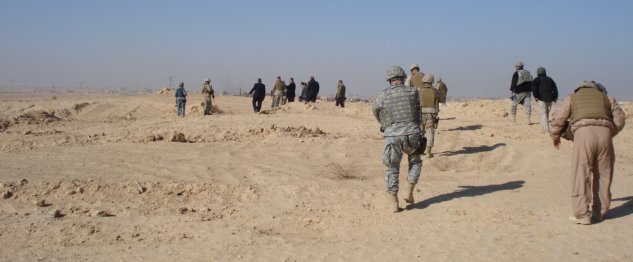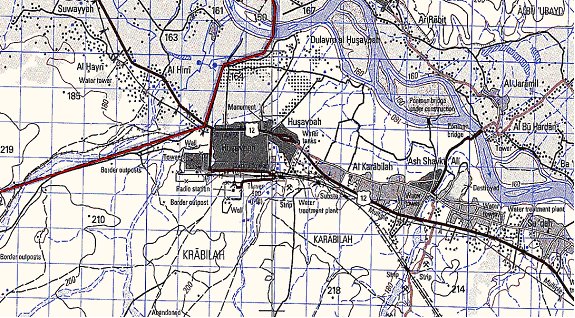
This is the potential free trade zone (FTZ). It looks the same no matter which way you look. Lots of room for expansion & nothing to stand in your way. BTW – This land has not been cleared. This is more or less what it looks like in its natural state. About 1/2 mile from here the landscape turns green near the river; beyond that nothing grows. The change is very abrupt.
I thought that we were to look at a potential free trade zone at or very near the POE. The Governor of Anbar and the Mayor of AQ had other plans and perhaps better ideas. They showed us their choice for a future FTZ some twenty-seven kilometers to the east of the POE along Hwy 12 outside the village of Karabilah. Please see the nearby map.
They understand that a FTZ need not be right on a border (Brazil has a FTZ located in along the Amazon River very nearly in the geographical center of that vast country, for example.) and that it is more of an administrative concept than a physical infrastructure. In other words, it makes much more sense to locate the FTZ where it makes business sense rather than next to the POE just because there is a POE. The Governor and the Mayor were thinking right. This FTZ is currently a large area of nothing but dirt and sand, but this pile of dirt and sand has the advantage of being near roads, the railroad, water resources and electric power lines. The governor envisioned at least three stages of building the FTZ, correctly pointing out that there was room to expand should expansion be required. Like everyplace else around here, there is plenty of free parking. We will be getting the details of the FTZ soon, such as the number of hectares and the precise location. An important question beyond these technical ones would be, “what do we envision being made in the FTZ?” Most FTZs are home to assembly industries, where value is added to imported materials and finished products are exported. This particular FTZ does not have access to abundant supplies of inexpensive labor or raw materials with significant potential for value added. The principle local industries are cement & phosphate production along with various types of agricultural enterprises, especially sheep. These products are not highly processed.
There was some discussion about specialty agricultural products, such as cut flowers or high quality vegetables that could be processed in the FTZ and then shipped fresh to markets in Europe or the Middle East. (Fresh cut flowers are profitably shipped from places like Kenya to Amsterdam on a daily basis.) Iraq certainly has the soils, water and climate (complementary to Europe’s) to support such endeavors. The infrastructure piece missing from this equation is a good airport. These high value perishable items are usually shipped via air transport.
It looks bleak now. In fact it makes me wonder why we call it REconstruction. There doesn’t seem to me me “re” here. But things take time and all accomplishments require someplace to start.

